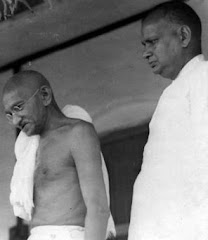Perched on said hilltops loom the imposing structures that compose the illegal Israeli settlements of Yizhar to the South West, and Bracha, to the North East. Together, they effectively sandwich Burin beneath them and impinge upon the everyday movements of its inhabitants. Their guard towers, mounted with snipers posts and telephoto security cameras, have a birds eye view of all that transpires in the valley below, nothing goes unseen. Fields that were once cultivated near these militarized outposts now lie barren and unused, the result of systematic settler intimidation, harassment and violence.
And yet, this is easily forgotten by the end of a long and at times monotonous day's work in the olive orchard. Having survived the monotony, I find myself riding back to Burin in the back of a tractor that has seen better days and at the mercy of a driver who seems to have little regard for his cargo; several large burlap sacks of olives, myself, Sam, two international volunteers from ISM, Hassan and his mother. Eventually we arrive at Hassan's house and are treated to an excellent home-cooked meal, all the while enjoying an elevated level of warmth and hospitality that seems to personify the Palestinian household.
Following dinner, we step out onto the front porch for a cup of coffee and are met with a sight that shocks both Sam and I, but leaves Hassan and his family strangely calm and composed, seemingly completely unphased. Looking across the valley to the hillside we had been working on no more than an hour before, plumes of dark smoke are rising and orange flames are increasingly visible as dusk sets in. The source of this blaze is abundantly clear to me without a second thought; settlers have set the orchards on fire, an act of arson. This is a common practice used to harass and make life unbearable for the village's residents. We decide to go for a closer look, to document this incident and to lend a hand if possible.
Jumping in a servis with Hassan and the two ISMers, Sam and I jet across town, hop out and sprint uphill from the floor of the valley towards the fire. We are amongst the first to arrive, beaten only by a couple of men from the local fire brigade who are trying, largely in vain, to curb the fire's voracious appetite as it spreads up the hill. Eventually around twenty-five young men scramble up from the village to join in this effort. They are equipped with only the most basic of tools, namely rubber mats and fistfuls of dirt, which they use to smother the fire and counter its spread. The level of comradery and bravery exhibited is astounding. Although most of these men have no training and are merely responding to defend their village from an imminent threat, they manage to contain the flames and get the situation under control.
The most incredible part of this experience to me, however, is the collective calm and cool-headedness exhibited by the Palestinian citizens of Burin throughout the entire ghastly incident. I witnessed a group of young men whose land and source of livelihood was attacked in a brutal, premeditated, and ethnically motivated fashion. In response, they came together as a community, dealt with the problem at hand and then went home to their families. Where I was infuriated by the aggression against their village, they took it in stride and went about their daily lives, undoubtedly upset but able to suppress these feelings by acting rationally and avoiding escalation. This level of violence should not be tolerated in any society yet it has been normalized within this one.
-John











1 comment:
Great post. How one feels for the long suffering Palestinians and the world seems so unaware. The village of Burin has seen constant harassment even death threats. Thank you MPTers for being there and witnessing to their valor and nonviolent response to such horrible oppression.
Post a Comment